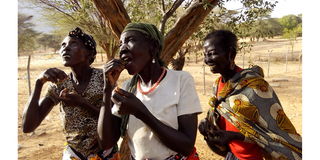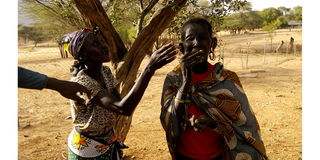Residents resort to wild fruits, leaves as drought bites in West Pokot

Starving women pick wild fruits from trees in Lokitanyala village, West Pokot County.
What you need to know:
- Thousands of West Pokot residents in dire need of food.
- The region experienced total crop failure in the last planting season.
- The dry spell has lasted months, leaving people surviving on blood and milk as they travel kilometres in search of water and pasture.
It is 1pm on a Monday and young women are busy climbing trees to pluck wild fruits and traditional vegetables in the remote village of Lokitanyala in Pokot Central, West Pokot County.
Known as sokoria and sikothi, respectively, the wild fruits and traditional vegetables are collected from the only trees in the region that still have leaves on them.
The trees are their only source of food whenever a devastating drought hits the area.
“We pick these leaves, boil them for a long time to remove the bitterness and poison and use them to feed our children and sustain ourselves,” says Joan Lotulia.
The women walk long distances looking for the berries.
Ms Lotulia had to migrate to a safer place after her livestock succumbed to drought.
“This place is so dry. The national government should invest in irrigation projects along the rivers to help us cultivate some food.”

Residents of Lokitanyala village in West Pokot eating wild fruits from a tree as the drought situation in the county persists.
Elsewhere, in Akiriment village, Masol ward, malnourished children, emaciated elderly women and men sitting under the scorching sun outside their dilapidated houses welcome us.
Chepurai Joseph, the mother of seven, says she and her children have not eaten for the whole week. “I have no hope of getting food today. We used to take blood and milk but now our livestock have migrated to Uganda,” she says as she cuddles her one-year-old baby.
They are among thousands of residents in West Pokot in dire need of food, following a prolonged drought.
The entire population in the county faces starvation after the region experienced total crop failure in the previous planting season.
Locals who spoke to the Nation said they survived on wild fruits.
Long dry spell
Joshua Lokienyang, a resident of Kacheliba, observed that they had planted poor seeds that led to low yields.
“We received little rainfall and our crops could not do well.”
Men have migrated with 90 percent of livestock, particularly to neighbouring Uganda in search of pasture and water.
In Karon and Kostei villages, the remaining weak and nursing livestock are emaciated due to lack of pasture. Livestock prices at local markets have dropped drastically as a result.
A goat that used to sell for Sh3,500 now goes for Sh2,000.
Ombolion Chief Joseph Korikimul said widows, expectant mothers and orphans are the most affected, and locals had not received any help.
“Kases, Takaywa, Lonyangalem, Tokou, Tingirik, Puriano, Kangulelipe and Ombolion villages have been hit hardest.”
The dry spell has lasted months, leaving people surviving on blood and milk as they travel kilometres in search of water and pasture.
The vast and arid West Pokot has over 800,000 people and gets short rains annually.
Most affected villages
Some of the most affected areas in North Pokot, Central Pokot and some parts of West Pokot sub-counties are Ombolion, Kasei, Turkwel, Kiwawa, Kodich, Alale, Kasei, Takaiywa, Chepkobhee, Suam, Kodich, Kiwawa, Turkwel, Chepkopegh, Nyangaita, Takaywa, Lorogon, Kasses, Konyao, Alale, Sarmach, Suam, Ombolion, Lonyangilem, Kapchok, Lomut, Sekerr, Kases, Lonyangelem, Takaywa, Tepericho, Seriacho, Chepkobhee, Sigor and Narwomoru.
Others are Riwo, Kacheliba in Pokot North and Masol, Turkwel and lower Sook in Central Pokot.
“We ask the national government to come and save the situation. We can’t wait until people die,” said West Pokot Governor John Lonyangapuo, who explained that a situational analysis had confirmed that over half of the population had run out of food stocks and most people were surviving on one meal a day.
“Last year there was total crop failure in my region and right now my people are suffering.”

Elderly women in Kamurio village in West Pokot County have not been spared the effects of drought.
Governor Lonyangapuo also cited the drying up of water sources.
“There is completely no water in the area as all the water points have dried up. The situation has worsened and there is a need for the government to urgently intervene.
“The food will not sustain the locals until the next season of harvesting.”
Huge maize farms that had the potential to produce large harvests, he said, had withered because of the little rain.
Governor's appeal
He appealed to the National Drought Management Authority (NDMA) and other agencies to put in place mitigation measures.
He appealed for food aid in hard-hit areas to help avert clashes over the little available resources.
“Along the border of West Pokot and Turkana we had experienced total calm and peace for close to five years, but the conflict has now resurfaced.”
He said 70 to 80 percent of families had been affected by drought and food shortages.
“We have programmes to cushion the vulnerable people like the aged and those living with HIV. There are also those people that are chronically food-insecure.
“The county government has been giving out pellets (for livestock) and high-value intervention feeds to affected people.”
NDMA report
West Pokot NDMA coordinator Mike Kimithi said hunger in the county was in the alert stage and was approaching the alarm stage, particularly in Pokot North, Pokot South and Pokot West.
But in Pokot Central, the situation was in the alarm stage and was worsening.
Mr Kimithi noted that water levels in the Nasal borehole that operated 24 hours had dropped.
“It only comes at 10am and goes away. The open troughs have gone low and animals are facing the challenge of accessing pastures and animal feeds.”
There was also no forage for Friesian cows in Pokot South.
Mr Kimithi said they were asking for food aid for the population.
“We were seeing some relief because of the signs of rainfall. The government and the Kenya Red Cross Society and USAID are giving out cash through the cash transfer programme and offering food supplements to affected populations.”
Mr Kimithi also said his agency was working to help residents feed the animals that had not migrated.





